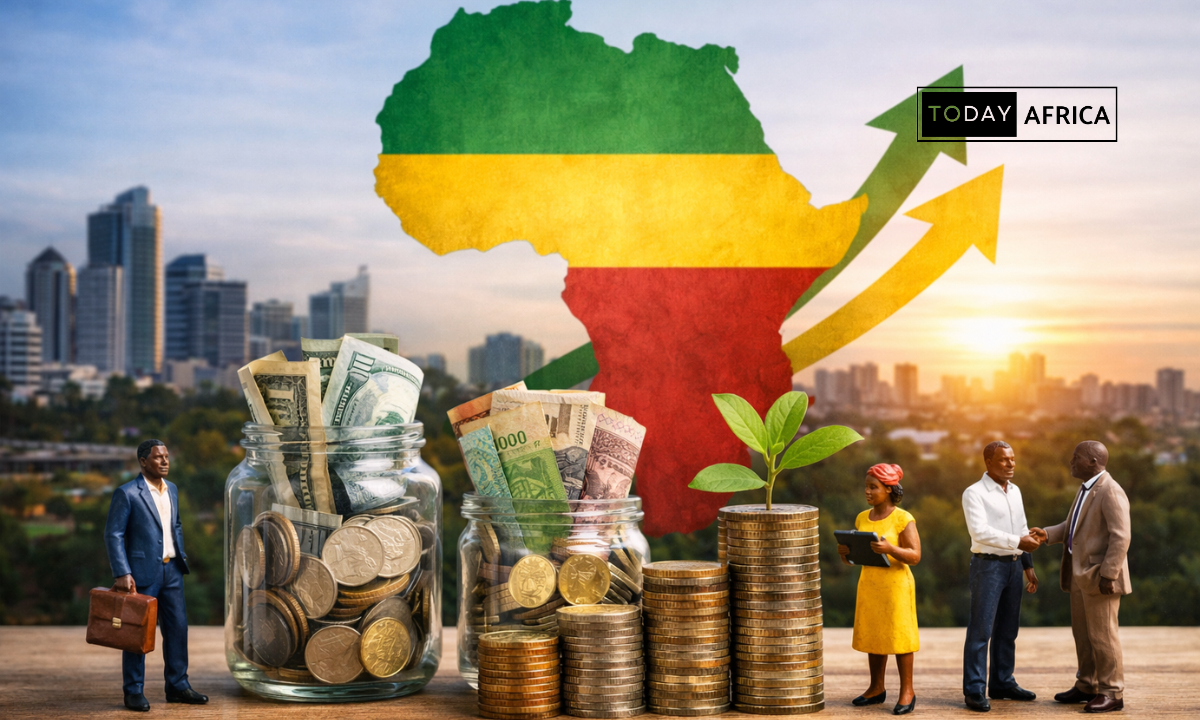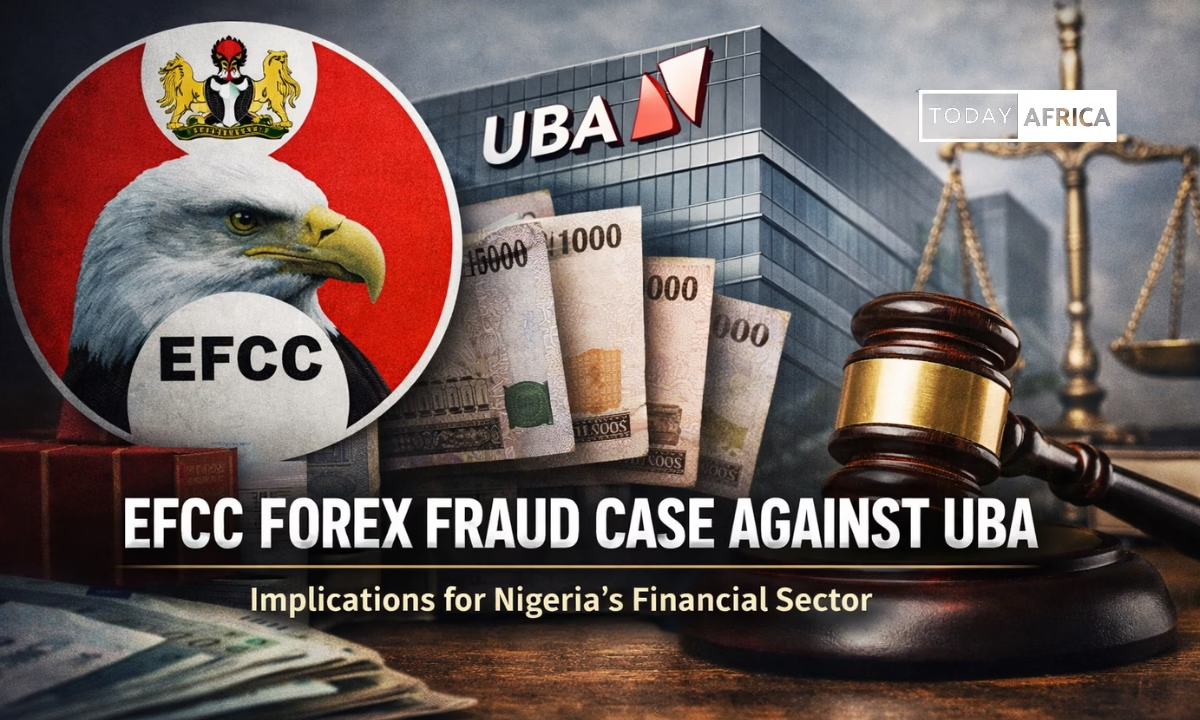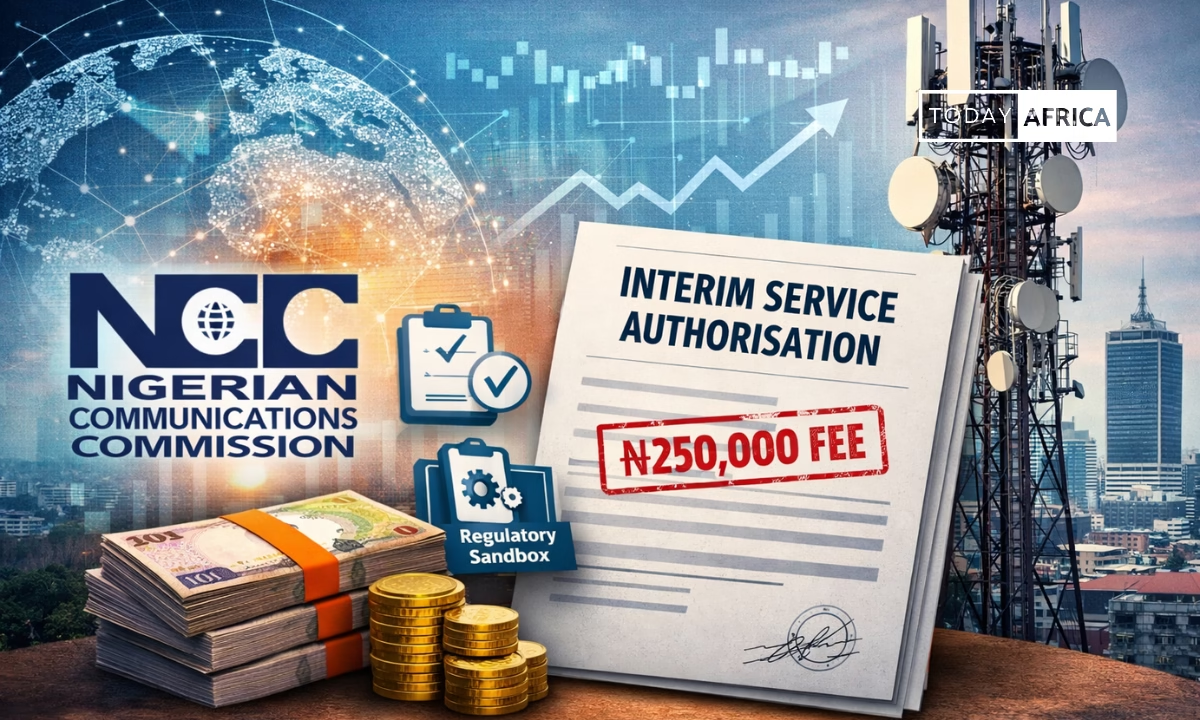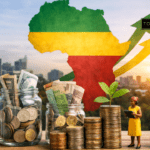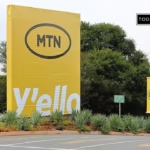Arnold Nyendwa, an entrepreneur and CEO of AFNON, has achieved remarkable success. His innovative spirit has led to the development of the Juvin stainless hybrid stove, a revolutionary product that operates on three energy sources: gas, electricity, and charcoal pellets.
This stove has garnered global recognition, earning a spot among the 1000 Efficient Solutions in the world, as accredited by the World Alliance for Efficient Solutions under the Solar Impulse Foundation in Switzerland.
Under Nyendwa’s leadership, AFNON has accumulated nearly 40 global awards for its clean tech innovation, solidifying its position as a pioneer in the industry. The company made history by becoming the first African-owned innovative product to be nominated for and win the esteemed Sir Henry Royce Award in the UK in October 2023.
Arnold Nyendwa shared with Today Africa about his entrepreneurial journey.
Tell us a bit about yourself and what your brand or your company is into?
I was born and raised in Zambia, I did my grade 1 to 12 in Zambia including my university study. I know there’s a lot of perception, most people think that I studied somewhere else. But obviously I was privileged because when I was about 16 to 22 I did a lot of traveling.
Being born in the eastern part of the country, my hometown, Kortete. I was raised by Christian parents of the Seventh-day Adventist Church. I’m the firstborn in a family of five, with four siblings and one sister last born. I’m 27 years old, I’ll be 28 next month.
Currently, I don’t live in the capital, I live in the central part of the country, because that’s where I’m setting up also the largest coal factory in the continent, the coal factory producing gas and electric stove that’s where I’m based currently and that’s where I live.
My journey started way back when I was around 16 when I was almost completing my high school. And that’s when I got the interest in science and design. I had the ability to design. So I joined the science fair. It’s called JETS in Zambia. Junior engineers, technicians, scientists of Zambia.
It’s mostly present in schools. So you do a competition at school. Then you are selected. If you win, you compete with your project. You design a project. You compete in a science project at the district level and then you go to a province level, which you call states there in Nigeria.
Then from the state level, you go to the national level, and you compete with the entire nation. So it keeps on going like that. I did my first research to stop nose bleeding using onions.
And I went on to do another project that was about stopping Malaria. And I won with those two, but I never made it to the national, like the whole country competition. But in 2015, when Zambia was highly hit with load shedding, I discovered that I can do something. We had an energy deficit, no supply of power for 8 to 12 hours.
I designed this stove, which I called a brazier by then, which would cook, bake, fry, roast, warm, dry, and fry without using electricity. But it used just charcoal, so you cut trees, you make something that you start to show and you put it there.
But it wasn’t obviously environmentally friendly and that’s how I moved from there. That project really went big. It took me to the National, which I had desired, and I won. I became the second best in the whole country.
Then I was completing my school, that was in 2015, so I completed my high school in 2015. And seven months down the line, I enrolled into university. But before I resumed my studies at the university I set up a small factory in another province called Copper Belt.
We have 10 provinces in Zambia. You can call them states for an easy explanation. So there’s a province which is a mining province, it’s called Copper Belt. That’s where I was staying with my parents.
I went there and set up a small factory with a certain welder because in school I used to take geometrical mechanical drawings, GMD, and metalwork. That’s how I completed my work from there and I started selling those units before I went to uni.
Before I got to university, I got a partnership in South Africa to exhibit and to improve the stove to the most advanced using stainless steel and advanced technologies. By the time I’m enrolling in school to start my degree program, I already got a deal, and every time I close, I fly to South Africa.
So my journey was now in South Africa. I closed that business because I was going to improve stoves in South Africa, which included research, and product development.
Things grew and my name became big in the country. I was on TV and I was 18, 19. I became the face of innovation at that age and I was famous in school. Sometimes I wasn’t comfortable coming out of my room because everyone knows you in school.
Read Also: How Gerald Revocatus is Making Digital Skills Accessible to African Youths
As a kid, did you envision or think about becoming an inventor, an entrepreneur, or you had other interests while growing up?

Growing up a lot of things obviously crossed my mind. A few events I can remember of my childhood was that I was high on football. I used to think I would be a footballer, people laugh at me, they think I can’t play football, but I’m really good at it.
I also did athletics in school. But I played football a lot, hurting myself because I played barefooted. I don’t come from a background that is wealthy, just an average normal family. So it was football with our friends, we constructed goal posts with mosquito nets.
I really enjoyed my childhood because during the holidays we’d go and see grandpa and grandma when they were still alive. We would pack a lot of mangoes, use any wood that you can shape into anything for artistic work. I would design a world cup because I love football very much, but it’s funny today, I don’t even watch football that much.
Unless it’s my national soccer team that’s playing. So that’s where we are coming from. Obviously, as Christians we went to church, and a bit of business. My parents had poultry and I sold ice blocks and water.
What were the challenges that you faced in the beginning of your journey and how did you overcome them?
The challenges in Africa are almost the same everywhere. You can look at them from different angles. You can talk about politics but I believe we’re learning as a nation.
The hard part was to create a narrative to convince everyone in this innovation space that this can be done in Africa. Because people believe that something like this can be done in China and America. It’s different when you are setting up a mine, cement, you’re putting up drinks, salt, or processing agricultural products.
They know they can be processed here. But this is a different case. We’re talking about a stove because they’re thinking, can an African make a stove? So all those things had to take a lot. It was easy for the Chinese and people in the UK to accept me because they have been doing it for themselves.
But coming back home, they’re like, where do you put your wood, charcoal? So, basically it’s about perception and mindset.There are always gatekeepers who don’t want certain businesses, you become a disruptor. Obviously you have to be conscious about your life, you have to be conscious of who you deal with.
Overall, challenges are many, but these are the main ones. Also Africa is still struggling with the issues of capital. It’s a really big issue today because there’s so much presence of foreign direct investment, even local people, the local government, they believe so much in having foreign people to come and do stuff like this instead of believing in the local people.
Changing that narrative by telling the authorities, the people saying, we can do this thing. I think that’s also a big challenge we need to break and say, we can do it as local Africans. We don’t have to wait for foreign direct investment to come to the country.
How do you raise capital for your business?
Very interesting question. I think it’s always important for any entrepreneur to understand the types of financing. There is a loan financing, grant financing, which is money which you can access from development banks or international philanthropy organizations.

And the last one, equity financing where you sell part of the shares then there’s an investor who comes in, which is a common one, which everyone tries to rush for.
I think those are the major finance, but also there’s microfinancing, which you raise capital, probably from family savings, family investment or a business that you can run to micro-finance it until you are able to finance your business.
It depends on the scale which you want to scale to. So first of all to answer your question, it’s very difficult to raise capital but can be done. It’s very difficult because the hardware space requires an upfront investment before a big investment to the asset comes.
Because the asset that makes a hardware product is a specific asset. So you design what we call mode to produce that specific product. For instance, a stove, you need to create a model of the store, and can’t produce another stove’s design.
You need an upfront payment to create that model and to produce that product. Take it for market testing, you need to have products. I remember the time when we were doing our product development in Asia and we spent about $1.1 million just to do our product development.
In Africa, nobody will put in that money for business development. But I’m glad I made a lot of connections around the globe with Chinese partners and other partners across the globe.
The Chinese partners contributed part of the project to see the relationships that we created. Also the UK played a very big part for us to be here today. So I came to this point because of a lot of support from them.
But 80% of our investments, obviously, are coming from the bank. That was just to square up the 20% from my end, because the bank will require you to put 30% of your investment, then they can put the other investment.
They don’t put money where you don’t put your money. So we are financing the stove factory without any equity partner, without any government support, or anybody’s support in terms of resources.
Maybe after this process, we might now see other support that might come in from other partners. The government has its own way to support maybe to facilitate transactions faster. Also, that is money because you know, time is money.
Read Also: Myra Samuelson, the Digiteacher Helping African Educators Increase Their Income
What benefit will your partnership with the Chinese brand bring to your brand, Zambia, and Africa?
Before we talk about partnership, being done at an individual level, at a national level, at a continental level. It’s good to define what you want on the table. Because if you do not know what you want, you’ll be given anything.

When we got to China for that particular partnership, we knew what we wanted. Did we want a joint venture? No. Did we want a liquidity partner? No. Or did we want to own our own assets? Yes and we were ready to pay for it. And that’s what we went there for.
It’s good that African nations and even entrepreneurs define what they want. We should be able to talk and listen to each other on the table to have that particular stand. Very, very important.
Secondly, China is a great partner, because China listens. I’m not saying others don’t listen. They listen too. China listened to what we wanted and they are delivering. In terms of development to the company, we’re able to catch up with the most advanced tech in the world and also to compete just the way things are happening in China.
Second, we are able to produce the quality and be able to reduce the challenges or energy deficit that is in Zambia. It’s also beneficial for the forex of this country to bring about trade balance to the country.
Most of the time we complain about inflation or the foreign currency because we don’t produce much and we don’t export much. We are also talking about the creation of jobs. This is a cry for every youth in the continent. Job opportunities for the youth, for the family, to be given an opportunity to be employed.
Another opportunity is for economic growth and inspiration, inspiring other industries to build more, to own assets, buy stock assets, that they should be able to transform lives of people. We cannot leave this job only to the government. Governments are trying to do their best.
Sometimes we say the government is not doing enough. The governments are trying but they need our support. They need us, the private sector, to help cushion this problem. Some projects might not require the government to do it, but private individuals can do it.
Because in business also it’s to understand it’s not just all about money. But what impact are you creating for others? For instance, we are creating around 2,500 to 3,000 jobs, just one factory. So you need to begin to understand how many lives you are going to impact.
Because money comes, money goes. We’re not the first to make money, we’re not the last. So our focus is not about money but we are looking at the lives we are going to touch when we still have the time on Earth. I think that’s what is important.
How is your business doing today and what does the future look like?

The business is going on good. We will be doing our first round breaking of the largest stove factory in March. Obviously the whole country will be on the stand still. It’s the largest factor in the continent. Very great history. A remarkable history. First indigenous hardware industry in Zambia.
We will be doing the groundbreaking in March. And it will be historical, it will bring back hope to the country in terms of industrialization. It will be something that will be very historical. But at the same time bring help to the country by creating jobs and opportunities.
What is the future looking like? The future is very bright. We’re looking at building a conglomerate in the hardware space, with presence in other continents, not only in Zambia. So we are bridging the gap like the West bringing things to us. It’s now us to take things to the West.
They need to import now from us. That’s what we’re doing, and we’re bridging that gap. We have 10+ other assets that are pending on the list to be installed, all the largest assets in the continent. We’re looking at all that and many more. So that’s what I would say for now.
Are your products patented?
Yes, there’s what we call copyright in industrial designs. So we have done industrial designs and patents, and all are well and safe.
Read Also: Inspiring Startup Stories of 16 African Entrepreneurs We Interviewed
What are some key lessons that you have learned in your journey as an entrepreneur?
There are a lot of lessons, but the first one will be to trust in God, which is the most important thing. Trust in God and trust in the process. Don’t bark at any dog that is barking. Don’t respond. Believe in yourself and communicate it to the world how you want it to be done.

Because the world doesn’t perceive what’s in your mind so it’s up to you to tell the whole world how many times you want to tell them, how do you want to tell them, who do you want to reach?
And a dream doesn’t happen in a day. You need to keep on every day pushing and telling the world. And the world will keep on listening until they accept. Patience, perseverance, and trust in the process, no matter how things go down.
What advice would you give to others who are looking to start their business?
There is no one who owns the world, no matter where you come from. There’s only one God in heaven who owns the world. Yes, I know there is power, there’s authority, there’s this, there’s that, but no one can stop what God has destined.
You can be anything from wherever you come from. I know some people will say, oh, I don’t have resources, even me, I didn’t have resources, everyone didn’t have resources. I’ve been doing this for 10 years straight. It only worked out after 10 years.
So you need to put in your time, you need to put in your energy, put in your best. But anyone can become anything, you can even become better than me. I shouldn’t be your standard. God is the one who sets standards for people and how far you can go.
So there are no limits to this universe. You can do what you want to do. Today don’t sell off your destiny, because how we sell off our destiny as young people is that when I see a person who is doing fine today because he has a big car, then I get intimidated that I can’t be better than them. Or because they own one or two things. No!
You are created different, and you are different. And you never live again because you only have one purpose. So even young people who come to me, I tell them, you can actually do better than me, you can do even more than this. This is actually probably nothing, when you focus on yourself and work.
So you can become anything on this Earth, all you need is to start. And you need to keep on working, and working, the more you put in work, the more results you keep getting. If you don’t put in the work, God won’t bless you because he doesn’t give you blessings on a silver platter.

So you need to put in the work. You use your brain, your hand, to get what you want. And these things are in people again, you don’t have to do it on your own. You need collaborations, you need partnerships.
If you want to go far, know how to do partnerships. Don’t just sit down and say, I can do it on my own. It’s not true, again. Identify also people who are good in areas that you’re weak. Identify them.
Let them tell you where you are. If you can’t do accounts, find a person who can do accounts for you instead of you wanting to know everything to do anything. So it’s all about partnerships, collaborations, belief, and pushing every day to get where you’re supposed to be.
Click here to read the part 2 of the interview with Arnold Nyendwa.
To find out more, Arnold Nyendwa contact via:
Leave a comment below and follow us on social media for update:
- Facebook: Today Africa
- Instagram: Today Africa
- Twitter: Today Africa
- LinkedIn: Today Africa
- YouTube: Today Africa Studio


